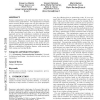Free Online Productivity Tools
i2Speak
i2Symbol
i2OCR
iTex2Img
iWeb2Print
iWeb2Shot
i2Type
iPdf2Split
iPdf2Merge
i2Bopomofo
i2Arabic
i2Style
i2Image
i2PDF
iLatex2Rtf
Sci2ools
144
click to vote
CORR
2008
Springer
2008
Springer
Energy Aware Self-Organizing Density Management in Wireless Sensor Networks
Energy consumption is the most important factor that determines sensor node lifetime. The optimization of wireless sensor network lifetime targets not only the reduction of energy consumption of a single sensor node but also the extension of the entire network lifetime. We propose a simple and adaptive energy-conserving topology management scheme, called SAND (Self-Organizing Active Node Density). SAND is fully decentralized and relies on a distributed probing approach and on the redundancy resolution of sensors for energy optimizations, while preserving the data forwarding and sensing capabilities of the network. We present the SAND's algorithm, its analysis of convergence, and simulation results. Simulation results show that, though slightly increasing path lengths from sensor to sink nodes, the proposed scheme improves significantly the network lifetime for different neighborhood densities degrees, while preserving both sensing and routing fidelity. Categories and Subject Desc...
CORR 2008 | Education | Network Lifetime | Sensor | Sensor Node |
Related Content
| Added | 09 Dec 2010 |
| Updated | 09 Dec 2010 |
| Type | Journal |
| Year | 2008 |
| Where | CORR |
| Authors | Erwan Le Merrer, Vincent Gramoli, Anne-Marie Kermarrec, Aline Carneiro Viana, Marin Bertier |
Comments (0)

